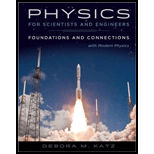
Initially, ball 1 rests on an incline of height h, and ball 2 rests on an incline of height h/2 as shown in Figure P11.40. They are released from rest simultaneously and collide elastically in the trough of the track. If m2 = 4 m1, m1 = 0.045 kg, and h = 0.65 m, what is the velocity of each ball after the collision?
The velocity of each ball after collision.
Answer to Problem 41PQ
The velocity of ball 1 after collision is
Explanation of Solution
Apply conservation of energy for a ball falling from incline of height
Here,
Rearrange above equation to get
For ball 1 height
Substitute
Here,
From figure P11.40, it’s clear that ball 1 is moving along
Write the expression for the velocity of ball 1 before collision.
Here,
Substitute
Here,
From figure P11.40, it’s clear that ball 2 is moving along
Write the expression for the velocity of ball 2 before collision.
Here,
Put equation (II) in the above equation.
It is given that the collision is elastic so that both kinetic as well as potential energy are conserved during the collision.
Write the expression for the velocity of the ball 1 after collision.
Here,
Write the expression for the velocity of the ball 2 after collision.
It is given that
Put equation (III) in equation (IV) and replace
Put equation (II) in the above equation to get final expression for
Put equation (III) in equation (V) and replace
Put equation (II) in the above equation to get final expression for
Conclusion:
It is given that the value of
Substitute
Substitute
Therefore, the velocity of ball 1 after collision is
Want to see more full solutions like this?
Chapter 11 Solutions
Physics For Scientists And Engineers: Foundations And Connections, Extended Version With Modern Physics
- No chatgpt pls will upvotearrow_forwarda cubic foot of argon at 20 degrees celsius is isentropically compressed from 1 atm to 425 KPa. What is the new temperature and density?arrow_forwardCalculate the variance of the calculated accelerations. The free fall height was 1753 mm. The measured release and catch times were: 222.22 800.00 61.11 641.67 0.00 588.89 11.11 588.89 8.33 588.89 11.11 588.89 5.56 586.11 2.78 583.33 Give in the answer window the calculated repeated experiment variance in m/s2.arrow_forward
- How can i solve this if n1 (refractive index of gas) and n2 (refractive index of plastic) is not known. And the brewsters angle isn't knownarrow_forward2. Consider the situation described in problem 1 where light emerges horizontally from ground level. Take k = 0.0020 m' and no = 1.0001 and find at which horizontal distance, x, the ray reaches a height of y = 1.5 m.arrow_forward2-3. Consider the situation of the reflection of a pulse at the interface of two string described in the previous problem. In addition to the net disturbances being equal at the junction, the slope of the net disturbances must also be equal at the junction at all times. Given that p1 = 4.0 g/m, H2 = 9.0 g/m and Aj = 0.50 cm find 2. A, (Answer: -0.10 cm) and 3. Ay. (Answer: 0.40 cm)please I need to show all work step by step problems 2 and 3arrow_forward
 Physics for Scientists and Engineers: Foundations...PhysicsISBN:9781133939146Author:Katz, Debora M.Publisher:Cengage Learning
Physics for Scientists and Engineers: Foundations...PhysicsISBN:9781133939146Author:Katz, Debora M.Publisher:Cengage Learning Principles of Physics: A Calculus-Based TextPhysicsISBN:9781133104261Author:Raymond A. Serway, John W. JewettPublisher:Cengage Learning
Principles of Physics: A Calculus-Based TextPhysicsISBN:9781133104261Author:Raymond A. Serway, John W. JewettPublisher:Cengage Learning Physics for Scientists and Engineers with Modern ...PhysicsISBN:9781337553292Author:Raymond A. Serway, John W. JewettPublisher:Cengage Learning
Physics for Scientists and Engineers with Modern ...PhysicsISBN:9781337553292Author:Raymond A. Serway, John W. JewettPublisher:Cengage Learning Physics for Scientists and EngineersPhysicsISBN:9781337553278Author:Raymond A. Serway, John W. JewettPublisher:Cengage Learning
Physics for Scientists and EngineersPhysicsISBN:9781337553278Author:Raymond A. Serway, John W. JewettPublisher:Cengage Learning University Physics Volume 1PhysicsISBN:9781938168277Author:William Moebs, Samuel J. Ling, Jeff SannyPublisher:OpenStax - Rice University
University Physics Volume 1PhysicsISBN:9781938168277Author:William Moebs, Samuel J. Ling, Jeff SannyPublisher:OpenStax - Rice University Classical Dynamics of Particles and SystemsPhysicsISBN:9780534408961Author:Stephen T. Thornton, Jerry B. MarionPublisher:Cengage Learning
Classical Dynamics of Particles and SystemsPhysicsISBN:9780534408961Author:Stephen T. Thornton, Jerry B. MarionPublisher:Cengage Learning





